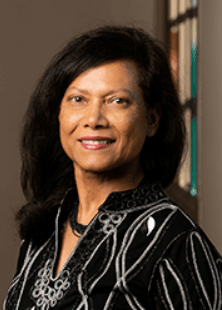
Vijaya Zinnoury
Each week, Daniels is featuring a researcher who conducts meaningful research that impacts their field and the wider community. Learn more about their work in Q&As with the Daniels Research team and email them to nominate yourself or a colleague for a future Q&A.
Vijaya (Vi) Zinnoury, associate professor in the Daniels Department of Management, has a PhD from the University of Illinois, Urbana-Champaign. Vi’s expertise is in business policy and strategy, global management, leading high-performance organizations, and global social entrepreneurship.
A gold medalist from India, Vi has received several research, teaching, reviewing, and service awards. A 2023 inductee of the Society of NACRA Fellows, she is a recipient of the Case Centre’s Outstanding Contribution to the Case Method Award in 2019, its Outstanding Case Writer award in 2018; and has five first prizes to her credit. In 2019, she was nominated for the SMS Teaching Impact Award. In 2017, she received USASBE’s 2017 MWE Professor of the Year Award and a service award from the Strategic Management Society. Vi has been a keynote speaker at conferences in Asia, Europe and Latin America, and an invited speaker at the Academy of Management’s strategy division and business schools worldwide.
What do you research?
Early on in my career, I could not find appropriate cases for my classes. When Daniels promoted case research through Boyer’s model of scholarship as a widened lens of research, I seized the opportunity to develop a portfolio of domestic and international cases on companies operating in a wide range of industries.
I like decision-oriented cases because there could be an ethical dilemma in an organization that could be used as a steppingstone to examine the decision, the process and actors involved under a set of theoretical lenses that can be applied in the discussion.
Can you give an example of the kinds of cases you research?
I have three. Last year, my co-author and I developed a case on OpenAI showcasing the launch of its for-profit subsidiary, focusing on why the structure changed, and what the potential ramifications could be. It is thought-provoking because Generative AI, with many unknowns, has a profound impact on our lives.
A second example (my favorite one) is a field-researched case about an entrepreneur from Spain—the only one in the world to produce “eco-friendly” foie gras while treating wild geese humanely. It integrates grand societal challenges and the United Nations’ Sustainable Development Goals (UN SDGs) in a robust discussion of the impact of pursuing profits and seeking unbridled growth in a large market like the U.S. It is a fun case, ranked in the top-three by my students, published in the Case Research Journal, this year.
My first published case was on a global nonprofit assisting Indian farmers, earning less than a dollar a day, with access to bicycles, as they needed affordable transportation for getting to and from markets to gain better trades. I interviewed the CEO, board of directors, a retired Ball Aerospace executive who was a consultant, and an engineer designing this unique low-cost bicycle. This case won an award and remains a great example of social entrepreneurship embedded with issues like product quality, organizational reputation and trust, and network collaborations.
It seems like you’ve flipped the model a little bit. Instead of bringing your research into the classroom, it sounds like you are actually looking at what your students need and researching cases that would fit into your curriculum.
We are in the business of training current and future leaders, and it is important for them to understand these critical issues and develop a strong appreciation for the processes and outcomes involved. Understanding how to remedy the situation is as important as understanding the challenges we face. So, I develop cases that allow us to explore important issues, including sustainable business practices, competition, and global phenomena like poverty and environmental sustainability.
When I engage in case research and develop cases, I look for different ways to create interactive experiences for students and engage with them in the classroom. I want to raise their awareness to examining complex decisions through multiple lenses and help them navigate how to make those decisions themselves in the real world.
How would you like to see your research impact the world?
Case research makes a strong positive impact when complex challenges and ethical issues are presented. Through thoughtful discussions, we enable students to develop critical thinking skills and use creativity and compassion in resolving them.
